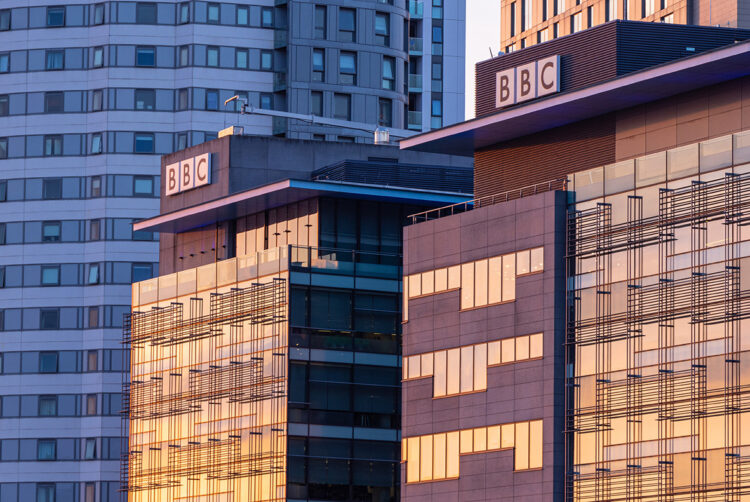When money’s too tight to mention

Opinion
Perhaps the beleaguered BBC can take a look at The National Lottery’s model and secure funding that can protect its independence from government.
Our vibrant if sometimes beleaguered industry has several dining clubs, with some keeping a lower profile than others. One is the Marketing Group of Great Britain, which meets monthly over dinner with a distinguished speaker.
It draws its senior membership from the three “estates”: advertisers, agencies and the media. A great network — if invited to attend, you should.
The guest keynote at a recent gathering was the impressive Andria Vidler, CEO of Allwyn, operator of The National Lottery since February 2024 and who also spoke at The Media Leader’s invitation-only Year Ahead event at the start of 2025.
Her career spans all three estates, with plenty of experience both public and private. Chatham House rule applied, but it wouldn’t be offside to report that she quite naturally covered the lottery’s scale, scope, successes and ambitions.
It attracts an average of £30m a week, totalling some £1.6bn a year. Essentially a retail, marketing and collection operation, it passes the funds on to the government, which, with various organs, committees and quangos, decides on worthy recipients and distributes them.
Over the course of its 10-year licence, Allwyn aims to double returns to The National Lottery-funded projects spanning sports, the arts, community and heritage.
Andria cited the Olympics as well as women’s and grassroots football performance as two examples of lottery-funded national successes.
Nor could our arts function without it. Notwithstanding the many public squabbles that surface from the long queue of claimants, it’s a national success — a commercially run source of significant public funding for our relevant institutions and an essential contributor to the fabric of our society.
How about Auntie?
This prompted me to consider another major national institution that needs some help.
It’s clear to me that we — and, indeed, the world — needs a strong and independent BBC more than ever. Not just for entertainment, of which there is plenty, and some of it extremely good.
The BBC’s current 10-year charter ends on 31 December 2027. That’s not far away considering its scale and scope, so no surprise that review teams at the BBC and the Department for Culture, Media & Sport are already hard at work.
(I’ve written before about the frequency with which culture secretaries change and the frustrations for business continually to readjust to these changes. Lisa Nandy is well-regarded, although rumours of her demise now circulate. Politics, eh?)
It’s in an iniquitous position. It can and does push back against the government, but too hard and it gets a slap from the hand that sustains its existence, comprising many who feel they do not get the treatment they as politicians deserve.
That said, the fact that such criticisms come in equal measure from all parties surely suggests the corporation is getting it right most of the time.
But increases in the licence fee — a tax by any other name — were capped below the rate that certain costs, notably talent and production, are rising. And it was saddled with taking over the political cost of free licences for the over-75s.
Meanwhile, the public has displayed its propensity to pay for additional channels and services, compared to which the BBC delivers good value — but it’s had to rein things in.
The debate over the World Service, one of the greatest instances of soft power, rumbles on. Swords hang over some foreign-language services like Radio Persia.
Programmes like the internationally regarded HardTalk have been closed, its award-winning presenter Stephen Sackur and team dismissed or redeployed.
Long-running current affairs flagship Newsnight is tending towards those myriad cheap-to-knock-out chat shows with thin panels that you see on French TV. The list goes on.
Challenges from all sides
A decade and a half ago, when enforced licence fee funding was flowing in, I thought the BBC was exceeding its remit to the detriment of commercial broadcasters by doing what it liked under “inform, educate, entertain” — a wholesome-sounding 1920s strapline that permits almost anything to air.
How things have changed.
The BBC now faces pressure on all sides — revenues, costs and significant challenge from global online platforms, streamers and commercial media players that don’t want or need to compete in areas where our society most needs the BBC.
Licence fee avoidance has been practically decriminalised, with the common understanding that you’re not going to get “done” — so that’s going to get worse.
Nor does the BBC help itself. Sprawling, too metropolitan, liberal, woke, too many middle managers, too much HR, expensive consultants…
It ventured and then withdrew a proposal to monetise its podcasts, but that wasn’t even chump change.
A new funding model?
But, despite all this, the BBC needs to continue and frankly needs some serious help of the kind The National Lottery might be able to offer.
It costs around £6bn, which dwarfs the lottery, but this isn’t about replacing the licence fee but, rather, enhancing it.
The lottery fund fields more calls than it can satisfy, although some of these might pale when compared to sustaining such a valuable national asset. And with Allwyn’s ambition to double revenues, headroom might well emerge.
While the BBC might foolishly spurn “charity”, such funding would help protect its independence from government. Yet research on this obvious notion largely draws a blank.
So how about it? Asking for a friend.
 Bob Wootton spent 40 years working in advertising, first as a media buyer at some of the UK’s leading agencies before joining the trade body Isba in 1996, where he was advertising and media director for 20 years. He is also the founder of Deconstruction, a media and tech consulting business, and presents The Guitar Show on YouTube.
Bob Wootton spent 40 years working in advertising, first as a media buyer at some of the UK’s leading agencies before joining the trade body Isba in 1996, where he was advertising and media director for 20 years. He is also the founder of Deconstruction, a media and tech consulting business, and presents The Guitar Show on YouTube.




